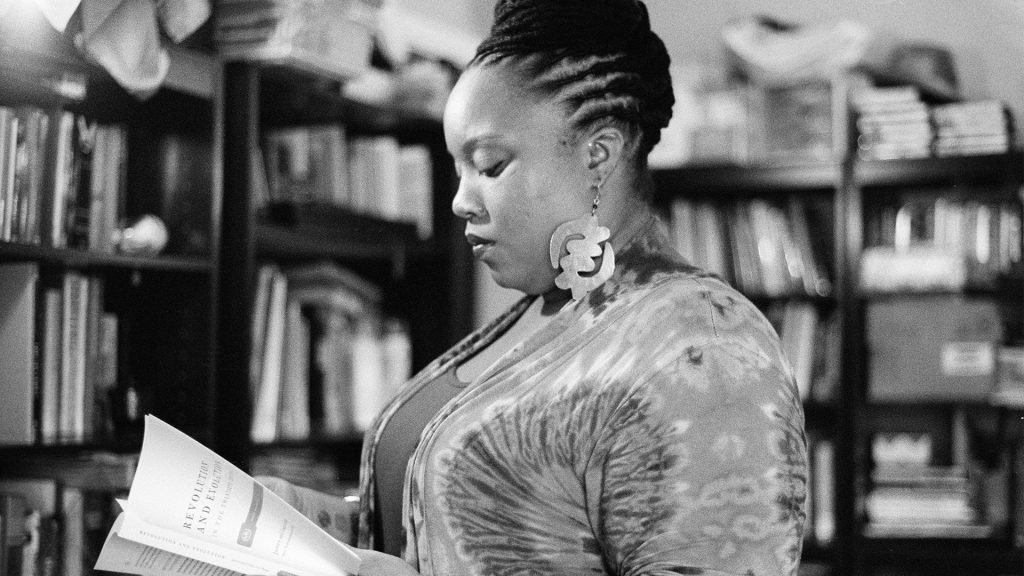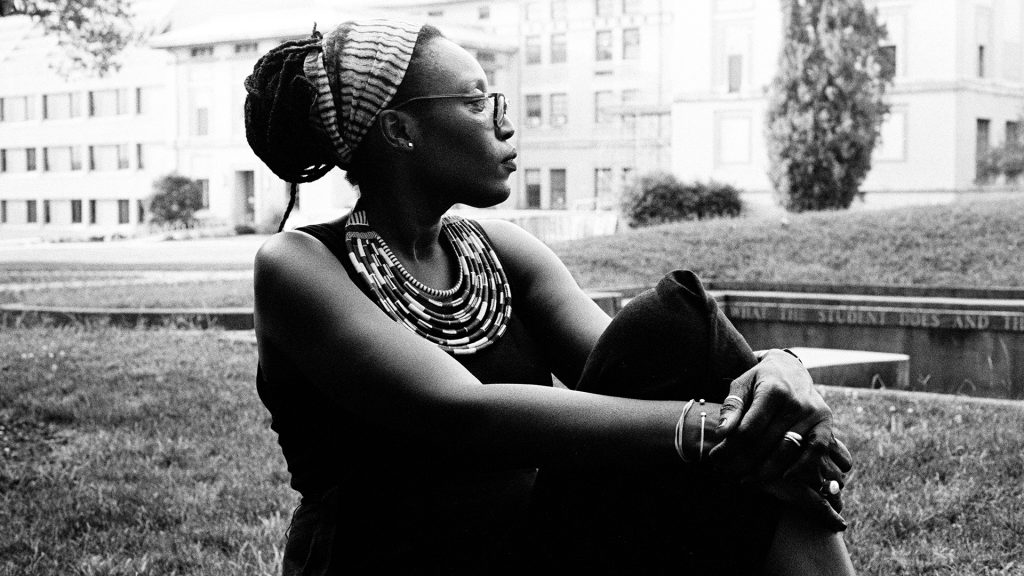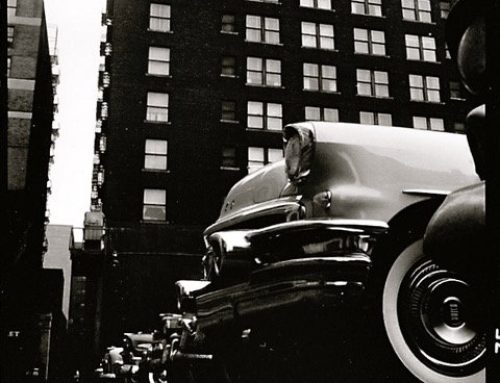A photo and interview series exploring how black artists living in a rapidly-changing Pittsburgh
see themselves and their work, in the contemporary context of the city and beyond.
By Njaimeh Njie
The contemporary Pittsburgh landscape is a shifting one, in which Black Pittsburgh residents are pushed to and beyond the literal margins of the city. Much of my work pushes back on this process, chronicling the diversity of everyday life for black Pittsburgh residents and exploring how the city’s past informs our experience of it today. I’ve long been interested in the tradition of black artists in Pittsburgh using their work to activate social consciousness and change, but my research showed me that too many of their narratives have been under-documented over the years. I wanted to take a proactive approach to documenting the experiences of a current generation of black creatives in Pittsburgh, for both today and posterity.
This series, “Dreaming a World,” is about capturing images of black artists engaging in their artistic practice. It’s also about carving out space for artists to describe themselves, their work, and how the city they live in influences what and how they create. The scope of these artists’ work is a representation of what life is like in Pittsburgh right now, but these individuals are also building visions for what a better version of this region can look like moving forward. I believe preserving their narratives will provide key context to how we think about this time and place in the future.
Bekezela Mguni
Radical Black Queer Pan-African Librarian Artist
b. San Fernando, Trinidad and Tobago
“I’m always just amazed at learning all the little nuggets of history that (especially) black Pittsburgh has contributed to. The people who are the storytellers and the history keepers, when they talk about the history of the Hill District, it’s a phenomenal story that you can’t help but be appreciative of and stunned by. I think that black people are genius creators. Just creative people and they will make some beautiful stuff wherever they are. And Pittsburgh—it’s so funny because it’s like I literally have stars in my eyes. I think there is something about Pittsburgh. There is a concentration of highly creative people here.
“I remember learning African art was never art for art’s sake. So our art, our writing, our creativity was never just to make a thing. It always served a purpose. And so, there’s these moments in my life where I’m like, ‘Okay, we don’t just make art for art’s sake. Our art serves the purpose of healing, of informing, of transforming, of creating a shift—a cataclysmic shift in the world. We have a purpose to what we do.”
I Medina
Spoken word artist, Poet, Blogger, Performance artist, Emcee
b. South Berkley, CA
“Coming from the Bay—South Berkeley, Oakland—[Pittsburgh] was definitely a culture shock. I was very shocked by community pockets where it was all black over here, all white over here. That separation and segregation. It was definitely something to get used to that I’m not fully used to, and I’ve been here about seventeen years. However, in terms of my lived experience, Pittsburgh is where I blossomed. It really is.
“There was a renaissance here. Pittsburgh has a place in international black arts, history, and culture. Pittsburgh has that history and should be a place that’s a creative hub for black people, but because of racism and racial injustice, there are more barriers than there should be to a lot of folks being able to actualize their vision. I’m sure it was a challenge all throughout history, and also contemporarily as well. Black artists just don’t get enough support, even though there’s some support out there.”
Alisha Wormsley
Interdisciplinary artist, community cultural producer
b. Pittsburgh, PA
“I feel super supported here, but I left Pittsburgh as soon as I could. I moved back as a grown up and already knew what my practice was. I already knew what kind of existence I wanted to have. I just want to be able to do what I love to do and be able to take care of my family doing that.
“I have a kid now. When you have a baby, the universe opens up to you. I just see things differently.
“I grew up loving sci-fi and fantasy, comic books, and that whole kind of superhero, magic, and witch stuff. The superhero thing is describing exactly black people. The things they had to withstand and survive from, is totally like there are superheroes. I’m a black woman, and I was raised by black women, and the most magical people to me are black women. We’re the mothers of humanity. Now I’m in this mystical, natural, more organic space, and those are the things I’m really thinking about.”
Mikael Chukuma Owunna
Photographer, fine artist
b. Pittsburgh, PA
“I really focus specifically around questions of identity and using and pushing the bounds of the photographic medium in order to create new universes where we can see glimpses of freedom for marginalized black communities. Growing up in Pittsburgh, and even just being queer and black and all these different things, I was always looking for another world to escape into. Kind of these anime worlds, these fantasy worlds—even reading—these were all worlds that I would escape into that were filled with magic and love and light.
“In my images, I pull in heavily from that sense of magic and light that I had. The reason my work is so magical is because it’s about pushing that imagination, pushing us into alternative universes, into alternative conversations; with ancestors, with non-ancestors, with everybody, so that we can imagine that future. Reach for that future. I think that images create a little bit of that space, but it’s more about unlocking a key within that person to dream a bit more.”
Heather Louise Manning
Writer, yoga practitioner
b. Meadeville, PA
“I don’t have a memory of exactly when I started writing, but I know that it’s always been a part of my self-preservation. Growing up being in Meadville and being in the country was awesome, then over the years [I] recognized it as somewhere that was a really violent place for me. It was a Northwestern PA town that’s majority white; there’s always an undercurrent of racism. I grew up with black hillbillies. That’s a different culture than Pittsburgh. Pittsburgh’s a Midwest culture. There’s a weird passivity here that I’m very unfamiliar with.
“I think one of the things that I think about on the daily, and I think you can’t help but to think about it living in Pittsburgh, is how complacent a lot of the white folks are [here]. I think when I come across that thought I am forced to reckon with my own values and who I really, really am. What I want people to know about me is that I’m committed to truth telling, I’m committed to the wellness of black women, and that includes myself. That’s never wavered. Maybe the state of Pittsburgh will change but that doesn’t change.”
Mame-Fatou Niang
Professor, documentary filmmaker
b. Dakar, Senegal
“I was just flabbergasted by the way in which living in Pittsburgh helped me understand my experience as a black woman in [Paris,] France. There’s just so many similarities between the two cities. I’m just looking at the way Pittsburgh is changing. Pittsburgh is trying to reinvent itself. Pittsburgh has been selling itself. When you’re talking about a way a city creates a new image of itself, you’d think about Paris. People always have this cloud of images: wine and romance and Eiffel Tower. People know Pittsburgh because of Google. People know Pittsburgh because of Amazon. People know the new Pittsburgh, in France.
“Pittsburgh is at this place where it’s recreating itself, wanting to have this new image, and by doing that, it’s erasing part of what it used to be. One of the things that is being erased—that is being rendered invisible—is blackness. You have the gentrification, the people are here to fight it, and sometimes, there’s kind of a sense of despair. It’s almost that this machine has already decided the face of the city, and who are we? It’s something that we’ve been through in Paris. It’s like this David against Goliath.”
Sheba G.
Multi-disciplinary artist
b. Brooklyn, New York
“I lift up and honor that I’m a transplant in the city. And I shout out all native Pittsburghers and all the work that ancestors have done in this city to make it so that I could even be sitting in this spot, having this conversation. Pittsburgh has been a really dope city, for me, to really explore my artistry. It’s also been really sad to watch gentrification on a very intimate [level]. You’re taking away names of, like, folks’ communities, you’re literally taking folks out of their communities, and you’re literally causing folks to lose access. It’s just land displacement. All over again, and again, and again.
“It makes me sad and excited at the same time, because Pittsburgh is a city where you can see folks speaking up and speaking out. There’s no silence in this city. Things happen in this city. Energy is vibrant in this city. There’s so much kinetic energy inside of this city. And it is not going to be bound or taped off by any perspective or thought.”
Billy Jackson
Media producer, educator, independent artist
b. Pittsburgh, PA
“Where’s the city heading? I’m not a forecaster; I don’t know that I’m in a position in accurately project that. It’s growing, it’s gonna grow. It’s going to succeed to the extent that it taps into that capitalism, i.e., tourism and materialism. Producing things. To the extent that blacks are involved in it, they will succeed to the extent that they invest in their culture, and their culture is accepted by the city.
“In ’65 when I left Pittsburgh, and even when I came back in ’85, if somebody were to tell me that we were gonna have a multi-million dollar footprint in downtown Pittsburgh for black people, I would’ve laughed at it. It just wasn’t predictable. The fact of having a black president before there was a black president was laughable. What the takeaway has been is that time marches on, and history is tomorrow. There is a continuum in that we as individuals, and as black people, need to support that continuum, and make sure that it’s sustainable.”
D.S. Kinsel
Cultural agitator, creative placemaker, cultural space keeper
b. Pittsburgh, PA
“We opened a space to exhibit and help artists grow, so it’s really exciting to see where and how the artist community has developed here in Pittsburgh. We’re always trying to do our best and connect, not only with cities in the Rust Belt, but cities that have a similar cultural footprint to Pittsburgh. We just hope our contemporaries and artists that are kind of coming up underneath us, or after us, will have that same fire and desire to do some true field building.
“Some people call [BOOM Concepts] a cultural kitchen. Some people call it a gallery. We’ve just been a place to make, and a safe place for people to be themselves, and try new things, and make mistakes, ‘cause you always need somewhere to make some mistakes. And we’ve been that place for a lot of people. And I believe that’s helpful.”
Sandra Gould-Ford
Literary artist, mixed media artist, photographer
b. Pittsburgh, PA
“I create, and present, and share art in order to encourage, to refresh, to enrich creative thinking, and inspire. Probably the basis of my work, is understanding that we all have journeys, and we’re all heroes of a story—of our own story. That we’re here to accomplish something magnificent in our lives.
“I think we’re a special population here, and I think in many ways, we’re here for a reason—to go through this, to prove something to ourselves. We came here and we survived. We didn’t die during the Middle Passage. We didn’t perish. We didn’t perish during slavery. We didn’t perish during Reconstruction. We didn’t perish through anything. We’ve been through all of this, and yet we survived. We’re beginning to manifest some things about ourselves, and I think that once we do that, we’re uniquely positioned to say we can do all of this incredible super-duper stuff because it’s in us. Here we are, and what are we going to do with this? We’re going to make a better world. That’s my hope.” ■

__
__
Njaimeh Njie is a multimedia producer and founder of the nonfiction storytelling company Eleven Stanley Productions. Njie was named the 2018 Emerging Artist of the Year by the Pittsburgh Center for the Arts, and her work has been featured in outlets including HuffPost Black Voices, Blavity, and the Carnegie Museum of Art Storyboard blog.
Belt Magazine is a 501(c)(3) nonprofit organization. To support more independent writing and journalism made by and for the Rust Belt and greater Midwest, make a donation to Belt Magazine, or become a member starting at $5 per month.
__
















